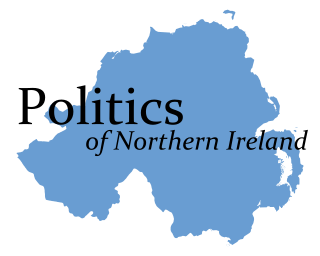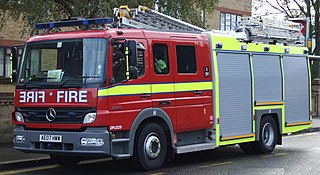
Northern Ireland is a part of the United Kingdom that is variously described as a country, province, territory or region. Located in the northeast of the island of Ireland, Northern Ireland shares a border to the south and west with the Republic of Ireland. In 2011, its population was 1,810,863, constituting about 30% of the island's population and about 3% of the UK's population. The Northern Ireland Assembly, established by the Northern Ireland Act 1998, holds responsibility for a range of devolved policy matters, while other areas are reserved for the British government. Northern Ireland co-operates with the Republic of Ireland in several areas.

The Government of Ireland Act 1920 was an Act of the Parliament of the United Kingdom. The Act's long title was "An Act to provide for the better government of Ireland"; it is also known as the Fourth Home Rule Bill or (inaccurately) as the Fourth Home Rule Act. The Act was intended to partition Ireland into two self-governing polities: the six north-eastern counties were to form "Northern Ireland", while the larger part of the country was to form "Southern Ireland". Both territories were to remain part of the United Kingdom of Great Britain and Ireland, and provision was made for their future reunification through a Council of Ireland. The Act was passed by the British parliament in November 1920, received royal assent in December, and came into force on 3 May 1921.

The Northern Ireland Assembly often referred to by the metonym Stormont, is the devolved legislature of Northern Ireland. It has power to legislate in a wide range of areas that are not explicitly reserved to the Parliament of the United Kingdom, and to appoint the Northern Ireland Executive. It sits at Parliament Buildings at Stormont in Belfast. The Assembly was in a period of suspension until January 2020, after it collapsed in January 2017 due to policy disagreements between its power-sharing leadership, particularly following the Renewable Heat Incentive scandal. In January 2020, the British and Irish governments agreed on a deal to restore devolved government in Northern Ireland.
The boundary commissions in the United Kingdom are non-departmental public bodies responsible for determining the boundaries of constituencies for elections to the House of Commons. There are four separate boundary commissions:

The Northern Ireland Executive is the devolved government of Northern Ireland, an administrative branch of the legislature – the Northern Ireland Assembly. It is answerable to the assembly and was initially established according to the terms of the Northern Ireland Act 1998, which followed the Good Friday Agreement. The executive is referred to in the legislation as the Executive Committee of the assembly and is an example of consociationalist ("power-sharing") government.

Northern Ireland is divided into 11 districts for local government purposes. In Northern Ireland, local councils do not carry out the same range of functions as those in the rest of the United Kingdom; for example they have no responsibility for education, road-building or housing. Their functions include planning, waste and recycling services, leisure and community services, building control and local economic and cultural development. The collection of rates is handled centrally by the Land and Property Services agency of the Northern Ireland Executive.

United Ireland, also referred to as Irish reunification, is the proposition that all of Ireland should be a single sovereign state. At present, the island is divided politically; the sovereign Republic of Ireland has jurisdiction over the majority of Ireland, while Northern Ireland, which lies entirely within the Irish province of Ulster, is part of the United Kingdom. Achieving a united Ireland is a central tenet of Irish nationalism, particularly of both mainstream and dissident Irish republican political and paramilitary organisations. Unionists support Northern Ireland remaining part of the United Kingdom, and therefore oppose Irish unification.
A municipal corporation is the legal term for a local governing body, including cities, counties, towns, townships, charter townships, villages, and boroughs. The term can also be used to describe municipally owned corporations.
The Northern Ireland flags issue is one that divides the population along sectarian lines. Depending on political allegiance, people identify with differing flags and symbols, some of which have, or have had, official status in Northern Ireland.
Borough status is granted by royal charter to local government districts in England, Wales and Northern Ireland. The status is purely honorary, and does not give any additional powers to the council or inhabitants of the district. In Scotland, similarly chartered communities were known as royal burghs, although the status is no longer granted.

The fire services in the United Kingdom operate under separate legislative and administrative arrangements in England and Wales, Northern Ireland, and Scotland.

The Department for Communities is a devolved Northern Ireland government department in the Northern Ireland Executive. The minister with overall responsibility for the department is the Minister for Communities. The department was previously created in May 2016 following the Fresh Start Agreement and the dissolution of several departments, such as the Department for Social Development, the Department of the Environment, the Department of Culture, Arts and Leisure and the Department for Employment and Learning from which several functions have amalgamated.

The Department of the Environment was a devolved Northern Irish government department in the Northern Ireland Executive. The minister with overall responsibility for the department was the Minister for the Environment.

The Department of Education (DENI) is a devolved Northern Irish government department in the Northern Ireland Executive. The minister with overall responsibility for the department is the Minister of Education. The current Minister of Education is Michelle McIlveen as of 14 June 2021.

The Department of Finance is a devolved Northern Ireland government department in the Northern Ireland Executive. The minister with overall responsibility for the department is the Minister for Finance.
The Brookeborough ministry was the third Government or Executive Committee of the Privy Council of Northern Ireland. It was led by Basil Brooke, who was Prime Minister from 1 May 1943 to 26 March 1963.
The Parliament of Northern Ireland was the home rule legislature created under the Government of Ireland Act 1920, which existed from 7 June 1921 to 30 March 1972, when it was suspended. It was subsequently abolished under the Northern Ireland Constitution Act 1973.
The Parliament of Northern Ireland was the home rule legislature created under the Government of Ireland Act 1920, which existed from 7 June 1921 to 30 March 1972, when it was suspended. It was subsequently abolished under the Northern Ireland Constitution Act 1973.

The Executive Office is a devolved Northern Ireland government department in the Northern Ireland Executive with overall responsibility for the running of the Executive. The Ministers with overall responsibility for the department are the First Minister and deputy First Minister.

The First Minister and deputy First Minister of Northern Ireland are the joint heads of government of the Northern Ireland Executive and have overall responsibility for the running of the Executive Office.








